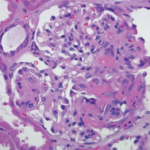Patient Advocacy Groups
In addition to research networks, patient advocacy groups have significantly contributed to clinical research in vasculitis. The VF, the world’s largest umbrella advocacy group for patients with vasculitis, has had a longstanding partnership with the VCRC in research and training, including through the VCRC-VF Fellowship and the VPPRN.
In the VPPRN, patients with vasculitis self-enroll, provide detailed clinical information and volunteer to take part in research studies online. This partnership has enabled direct engagement of patients, caregivers, investigators and health systems to develop research methods to electronically collect health records and patient-reported data on a large number of patients with various forms
of vasculitis.
More than 3,000 patients are enrolled in the VPPRN, which has completed, and has ongoing, projects in multiple forms of vasculitis. For example, the Vasculitis Pregnancy Registry (V-PREG) is an ongoing initiative studying the experience of women with vasculitis who become pregnant and the outcomes of their pregnancies.
The strength of this ready-for-research population was demonstrated by the VPPRN’s ability to rapidly launch a longitudinal study to understand how patients with vasculitis were dealing with the COVID-19 pandemic.
Several other national and disease-specific patient advocacy groups are also active around the world, each providing support and education to patients with vasculitis and often partnering with academic centers to conduct research.
Registries & More
Vasculitis research networks have developed longitudinal registries for different types of vasculitis by connecting major academic centers internationally. For rare diseases, such as vasculitis, longitudinal registries have been the foundation of clinical studies, creating large and unique databases of comprehensive clinical information, sometimes linked to biologic materials stored at centralized repositories.
For example, the VCRC Vasculitis Biorepository contains a large collection of specimens (i.e., DNA, serum, plasma, urine and tissue) from patients with any of several forms of vasculitis stored centrally at the University of Pennsylvania. All samples are linked to comprehensive clinical and phenotypic data.
Longitudinal clinical and biospecimen repositories exist for granulomatosis with polyangiitis (GPA), EPGA, microscopic polyangiitis (MPA), GCA, Takayasu’s arteritis (TAK) and polyarteritis nodosa (PAN). The VCRC has plans to start longitudinal registries for primary central nervous system vasculitis (CNSV) and relapsing polychondritis (RP), which will enable systematic collection of biologic samples, clinical data imaging and tissue, as well as the development of consensus-based diagnostic and classification criteria. Data from longitudinal registries have been used for many epidemiological studies, biomarker development and genetic analyses.
Other ongoing clinical and translational projects worldwide include a project of the FVSG, PNEUMOVAS (ClinicalTrials.gov identifier: NCT02463578), testing the immunogenicity and safety of two innovative anti-pneumococcal vaccine strategies against standard vaccination regimen after induction of remission of ANCA-associated vasculitis with rituximab; a VCRC multicenter observational study to evaluate histopathology and transcriptomics of cutaneous lesions in systemic vasculitis (CUTIS; ClinicalTrials.gov Identifier: NCT03004326); and an ongoing study of interstitial lung disease in ANCA-associated vasculitis in Japan.
Several successful genome-wide association studies have been made possible through the combined efforts of VCRC and EUVAS, as well as Japanese and Turkish vasculitis groups. The ongoing VCRC Genetic Repository collects DNA and clinical data from patients with any of several vasculitides. In addition to large genome-wide studies, candidate gene studies are regularly conducted in vasculitis, including a recent analysis of DADA2 mutations in patients with PAN in collaboration with the NIH.


